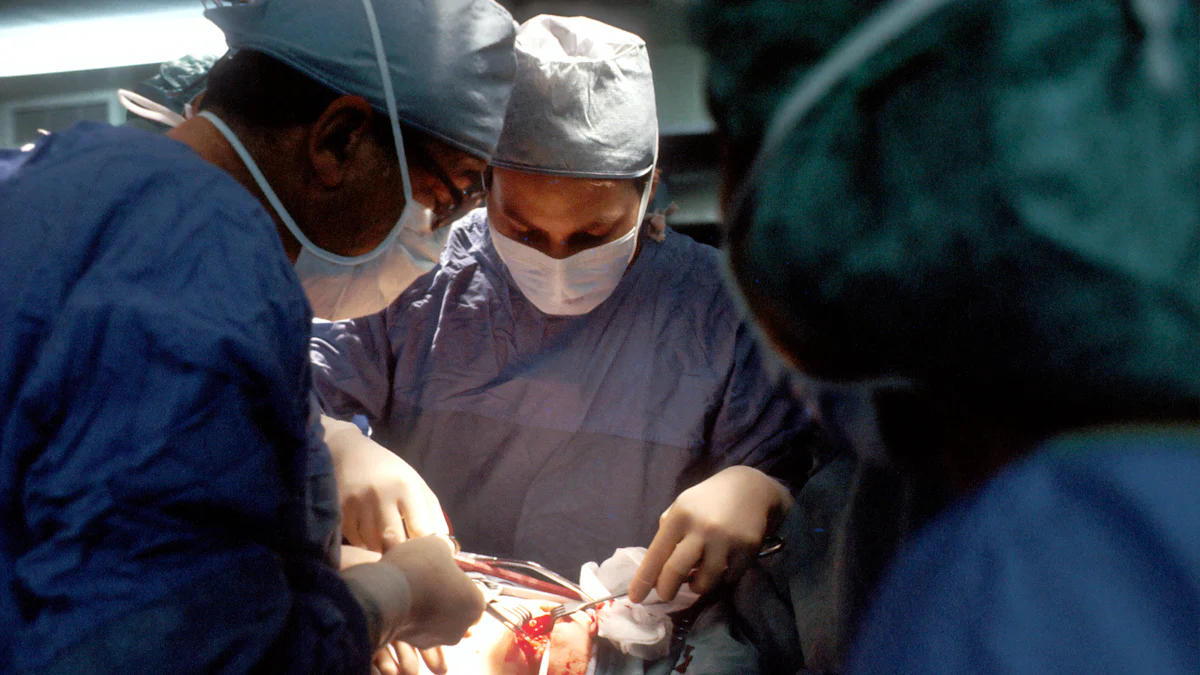
Understanding Gastric Sleeve Surgery
Gastric sleeve surgery, also known as sleeve gastrectomy, is a surgical procedure designed to aid in weight loss by reducing the size of the stomach. This restrictive procedure involves the removal of a large portion of the stomach, leaving behind a smaller banana-shaped "sleeve." By reducing the stomach's capacity, gastric sleeve surgery helps individuals feel full more quickly and consume fewer calories. This results in significant weight loss over time.
Important Note: Gastric sleeve surgery is a non-reversible procedure that requires careful consideration and thorough understanding before making a decision.
Weight Loss Surgery Options
When considering weight loss surgery options, individuals have several choices to address obesity and its related health concerns. Among these options, gastric sleeve surgery stands out as a popular choice due to its effectiveness in promoting significant weight loss and improving overall health.
Types of Weight Loss Surgery
Gastric sleeve surgery, also known as sleeve gastrectomy, involves the removal of a large portion of the stomach to create a smaller "sleeve." This restrictive procedure limits the amount of food the stomach can hold, leading to reduced calorie intake and subsequent weight loss. In comparison with other weight loss surgeries such as gastric bypass or adjustable gastric banding (lap band), gastric sleeve surgery has gained popularity for its effectiveness and relatively lower risk of complications.
Eligibility for Weight Loss Surgery
Determining eligibility for weight loss surgery involves assessing various factors such as body mass index (BMI), obesity-related health conditions, and previous attempts at non-surgical weight loss methods. Individuals with a BMI over 40 or a BMI over 35 with obesity-related health issues may be eligible for weight loss surgery. However, certain health conditions such as untreated psychiatric disorders or substance abuse may make someone ineligible for these surgical procedures.
Risks and Benefits
Risks of Gastric Sleeve Surgery
Gastric sleeve surgery, like any surgical procedure, carries certain risks and potential complications. It's essential for individuals considering this weight loss option to be aware of these factors before making a decision.
Potential Risks and Complications: Some potential risks associated with gastric sleeve surgery include bleeding, infection, blood clots, and adverse reactions to anesthesia. Additionally, there is a possibility of leakage from the staple line or the development of strictures (narrowing) in the stomach.
Minimizing Risks: To minimize the risks of gastric sleeve surgery, it's crucial for patients to follow their surgeon's pre-operative and post-operative instructions diligently. This includes maintaining a healthy lifestyle, attending follow-up appointments, and adhering to dietary guidelines.
Benefits of Gastric Sleeve Surgery
Despite the potential risks, gastric sleeve surgery offers numerous benefits that can significantly improve an individual's overall health and quality of life.
Positive Outcomes: The primary benefit of undergoing gastric sleeve surgery is substantial weight loss within the first year following the procedure. This weight loss often leads to improvements in obesity-related health conditions such as type 2 diabetes, high blood pressure, and sleep apnea.
Improvement in Health and Quality of Life: In addition to weight loss, many individuals experience enhanced mobility, increased energy levels, improved self-esteem, and reduced reliance on medications for obesity-related conditions after undergoing gastric sleeve surgery.
Preparation and Recovery
Preparation for Gastric Sleeve Surgery
Preparing for gastric sleeve surgery involves a series of essential steps to ensure the patient's readiness for the surgical procedure. These preparations are crucial for optimizing the outcome of the surgery and promoting a smooth recovery process.
Medical Evaluation: Before undergoing gastric sleeve surgery, individuals will undergo a comprehensive medical evaluation to assess their overall health status. This evaluation may include blood tests, imaging studies, and consultations with various healthcare professionals to ensure that the patient is physically prepared for the procedure.
Dietary and Lifestyle Changes: In preparation for gastric sleeve surgery, patients will receive guidance on making significant dietary and lifestyle changes. This often includes adopting a low-calorie diet to reduce liver size, which can facilitate a safer surgical procedure. Additionally, patients may be advised to refrain from smoking and limit alcohol consumption to support their overall health and well-being.
Important Note: It's essential for individuals preparing for gastric sleeve surgery to closely adhere to their healthcare provider's recommendations regarding pre-operative dietary and lifestyle modifications.
Recovery Process
The recovery process following gastric sleeve surgery is a critical phase that requires diligent post-surgery care and adjustments, both physically and emotionally.
Post-Surgery Care: After the surgical procedure, patients will receive specific instructions regarding wound care, pain management, physical activity limitations, and dietary guidelines. Following these instructions is vital in promoting proper healing and minimizing potential complications.
Recovery Timeline: The recovery timeline post-gastric sleeve surgery varies from individual to individual but typically involves several weeks of gradually reintroducing solid foods while allowing the stomach to heal properly. Patients should expect scheduled follow-up appointments with their healthcare team during this period to monitor progress and address any concerns that may arise.
Dietary Changes Post-Surgery
Post-Surgery Diet Plan
After undergoing gastric sleeve surgery, individuals will need to adhere to a specific post-surgery diet plan to support the healing process and promote successful weight loss.
Gradual Progression: The post-surgery diet plan typically involves a gradual progression from clear liquids to pureed foods and eventually, solid foods. This gradual approach allows the stomach to adjust to its reduced size while minimizing discomfort and potential complications.
Recommended Dietary Guidelines: Patients are advised to focus on consuming lean proteins, such as poultry, fish, and tofu, along with an emphasis on fruits, vegetables, and whole grains. These nutrient-dense foods provide essential vitamins and minerals while supporting the body's healing process.
Portion Control: Portion control is a key aspect of the post-surgery diet plan. Individuals should aim to consume small meals spread throughout the day to prevent overeating and promote effective digestion.
Hydration: Adequate hydration is crucial after gastric sleeve surgery. Patients are encouraged to drink plenty of water between meals while avoiding high-calorie beverages such as soda or sugary juices.
Nutritional Support and Supplements
Following gastric sleeve surgery, nutritional support and supplements play a vital role in ensuring that patients receive adequate nutrients for optimal health and well-being.
Importance of Nutritional Supplements: Due to the reduced stomach capacity following surgery, it may be challenging for individuals to obtain all necessary nutrients from food alone. Therefore, healthcare providers often recommend specific nutritional supplements such as multivitamins, calcium, vitamin D, and iron to prevent deficiencies.
Balancing Nutrient Intake: Achieving a balance in nutrient intake is essential for overall health post-surgery. Patients should work closely with their healthcare team to monitor their nutritional status and make adjustments as needed to maintain optimal health.
The dietary changes following gastric sleeve surgery are designed to support recovery, promote weight loss, and ensure long-term well-being.
Key Considerations for Gastric Sleeve Surgery
Before deciding on gastric sleeve surgery, it's essential to carefully weigh the requirements and implications of this procedure. Understanding the potential risks, benefits, and necessary lifestyle changes associated with gastric sleeve surgery is crucial for making an informed decision about pursuing this weight loss option. It's important for individuals to engage in thorough discussions with healthcare professionals to gain a comprehensive understanding of what gastric sleeve surgery entails and how it may impact their lives.

